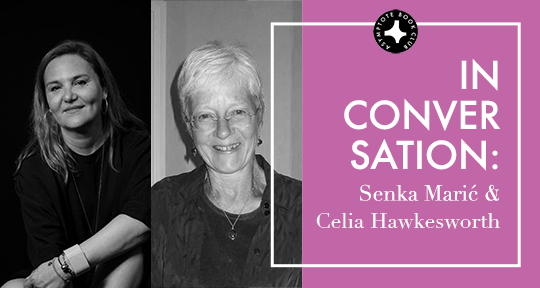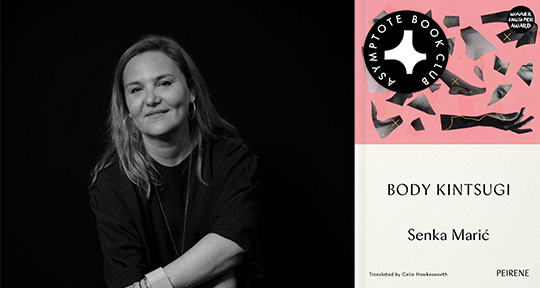Our October Book Club selection, Senka Marić’s Body Kintsugi, is a profound documentation of the author’s fight with cancer, and as such it is also an interrogation of time, of physicality, and of transformations. In writing of illness’ warping effect on reality, Marić broadens the claustrophobically private experience of disease and recovery to address universal themes of loss and survival. In this following interview, Carol Khoury talks to Marić and her translator, Celia Hawkesworth, about the immediacy of the text, the mirror image, and how powerful emotions can be distilled into text.
The Asymptote Book Club aspires to bring the best in translated fiction every month to readers around the world. You can sign up to receive next month’s selection on our website for as little as USD15 per book; once you’re a member, join our Facebook group for exclusive book club discussions and receive invitations to our members-only Zoom interviews with the author or the translator of each title.
Carol Khoury (CK): Despite the narrative of Body Kintsugi not being contemporaneous, it’s written with such an engaging power that it feels as though it is happening in real time. So my first question to you, Senka, is about your relationship with time. Is it really as you say in the book—that it has no meaning?
Senka Marić (SM): In a sense, I have told the story of a distinct experience—that of suffering from breast cancer—in a relatable way. Within those moments dictated by illness, time becomes really relative; it doesn’t flow as it normally would, as it is directed or determined by check-ups and operations and chemotherapies. All other matters really cease to exist in the reality of the person who is sick, and as such, time becomes relative, because everything that life normally contains is no longer present. For me, personally, that was the case.
CK: Celia, how did you experience time while you were translating this?
Celia Hawkesworth (CH): Because I had to spend a lot of my own time physically putting myself in the place someone who was going through such hell, I was always quite relieved to get to the passages where the protagonist was remembering her childhood, or other parts that took us a bit away from that continuous, strange world where time didn’t have the same meaning. It’s a bit like in Shakespeare, when you have high drama and high tragedy, and then occasional moments of release. I thought that aspect was very important for keeping one’s attention, but also giving one a bit of a break from the real horror of the suffering.
CK: Senka, one other element in the book that caught my attention is mirrors. There’s something like fifteen mentions—all of which refer to physical mirrors. Yet, the whole narrative is about another mirror. Might I say there was some sort of a mental mirror, one that you used not only to see and show the “you” and the “I”, but also to negate other existences.
SM: Frankly, I was trying to play with the idea of reality in its most basic sense: how we take things for granted, and how a sense of reality can be distorted when catastrophe occurs. That’s the background for the whole story—not being able to believe what reality is, and how we then perceive it. When everything is slipping out of our hands, time and space and mirrors in general are our checkpoints. We can be spiritual, we can be this and that, but in the most basic sense, we are physical beings, and we identify with the image of ourselves. We need the acknowledgment from the mirror that we are who we are. That’s why I wrote the moment in which the main character loses her hair, and she starts to cry. That’s the only time she actually really cries. READ MORE…



